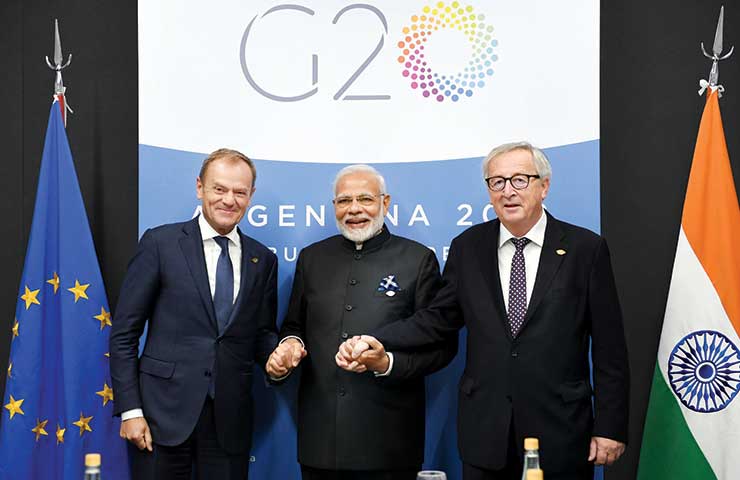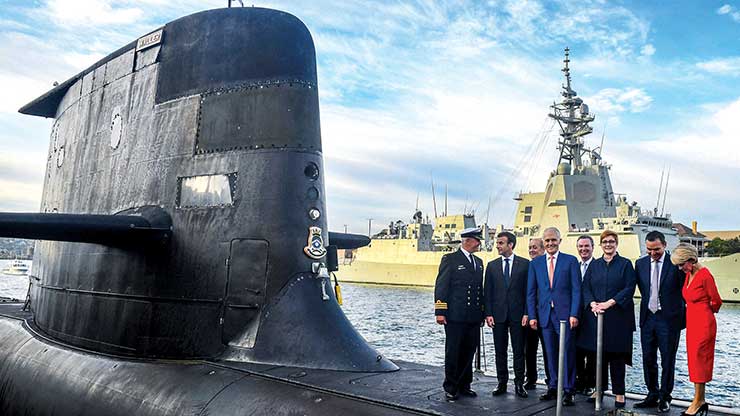France is assuming the presidency of the European Union, for the first time in 14 years, between January 1 and June 30, 2022. While no major divergence is to be expected in terms of European governance, the mandate is marked by Emmanuel Macron’s distinct notion of sovereignty and the Indian-French defence relationship.
A thriving EU-India relationship
The EU was India’s largest economic partner, before Brexit slashed the trade numbers by excluding British-Indian trade from the total. It is, however, expected to grow further as a bilateral economic partnership is to be inked in coming years, with France and Germany fuelling much of that growth on the European side.
The EU is neck-and-neck, in terms of trade, with the US and China. Strategy expert Christophe Jaffrelot writes: “In recent years, the EU has become India’s first or second trade partner. But the country represented less than 2.5% of EU trade in 2020 and ranked well behind China (16.1% of EU trade), the US (15.2%) and the UK (12.2%). Similarly, while European FDI in India more than doubled between 2011-2020, it remains much lower than in China.”
A large share of the economic interactions centre around nuclear power technology, digital services and sustainable development.
The 2021 EU-India summit had already paved the way for increased cooperation between the two economic powerhouses. The February 2022 Indo-Pacific cooperation summit refocused these relations, as designed by the EU, and took much notice of India’s other economic partners, namely China and the US.
The two global leaders represent as many pitfalls as opportunities for the EU, which still strives to this day, to establish a stable foothold on the global political and economic scene. Regional economic partners of India are also taken into account, as they carry the Commonwealth’s influence.
The French touch on the near horizon
France is expected to seize the opportunity of its presidency to strengthen and develop cooperation between the EU and India, with a renewed focus on two additional and largely complementary areas: sovereignty and defence, adding, to a certain extent, a French touch to their pre-existing relationship.
Paris already has an extensive background as a major defence and security partner for India. Behind this reality, lies the fact that India and France have similar conceptions of sovereignty. India is dedicated to multilateralism and cooperation, as its involvement with the UN and the WHO testifies, and its bilateral agreements with France and the United Kingdom.

Both India and France are global powers, which have to compromise with security partners, and therefore need to balance global interests with their specific national security setting. They also both focus on conflict prevention, weapon non-proliferation, anti-terrorism and organized crime prevention.
As a token of France’s strategic proximity with India, defence minister Florence Parly met with her Indian counterparts in December of 2021, just a year after her last visit in September of 2020. India, which had limited industrial military capacity in the early days of its independence, has several times turned to France to diversify its military supplies, in an initial strategy to guarantee its strategic freedom by not relying on too small a number of suppliers.
Defence specialist Ashok Sharma writes: “India has bought 36 Rafale fighter aircraft from France under a government contract signed in September 2016. India may buy some more Rafale aircraft, apart from medium-range helicopters for its navy and upgraded French Mirage fighter aircraft and submarines”.
India is upgrading its naval capacities and is receiving much attention from French defence industries. These projects go far beyond the delivery of equipment, however high-tech they may be: they represent technological transfers.
Defence journalist Deepanjan Chaudhury adds: “Over the past decades, France has been part of defence production projects in India. When asked about the expansion of French presence in the defence sector under ‘Make in India’ programme, the envoy claimed that France has always been a pioneer in defence production in India and is particularly committed to technology transfer under the Make in India programme.” As such, these contracts provide bricks for India’s sovereignty, not just temporary defence means, and will boost India’s self-sustenance in defence-related matters.
Moreover, the recent Australian betrayal of its French partners, in which Canberra broke its pledge to purchase 12 French submarines in favour of the Americans, further focused the industrial and strategic French interest on India.
In this respect, the naval world is notable playground for French-Indian defence cooperation, with joint patrolling agreements, maritime logistics assistance and naval exercises, as reported by NDTV: “As per an official release, the Indian Navy ships and aircraft will participate in a three-day exercise at sea with ships and aircraft of the French Navy (FN), Royal Australian Navy (RAN), Japan Maritime Self Defence Force (JMSDF) and the United States Navy (USN). The exercise La Perouse, led by French Navy, has participation by FN Ships Tonnerre, an amphibious assault ship and frigate Surcouf.”
The scuttling of the French-Australian submarine contract, and the trilateral security agreement, between the US, the UK and Australia (AUKUS) naturally contributed to the reinforcement of ties between France and India.
Macron’s conception of EU independence and sovereignty is deeply compatible with India’s interests. Research analyst Selen Temizer writes: “the idea of “autonomous military power” — which has been on the agenda for a long while — is discussed more frequently at times of crisis […] In June 2020, the EU began to work on an operational defence guide named “Strategic Compass,” and initially worked on threat analyses”.

France is pushing for Europe to become a self-standing powerhouse, with its own military capabilities, ranging from industrial production to full-fledged operational command. This strategic bearing fits India’s defence interests perfectly, to maintain and protect its standing in the Indo-Pacific region.
As standalone powers, India and the EU aim to maintain and develop their ability to operate freely into global matters, without depending on the American umbrella for its protection.
Ambitions meet constraints
Many security benefits can devolve from the strengthening of ties between the EU and India, provided they overcome two main obstacles. EIAS researcher Baptiste Dupont wrote in the aftermath of the 2022 Indo-Pacific summit: “The emphasis directed towards the new strategic centre of world affairs defines the EU’s ambition to become its own master in a world order which is being increasingly dominated by both the US and China.”
The first obstacle is that conceptions of defence aren’t shared widely amongst EU members. Germany, for instance, is considered by many to have formed, alongside France, the backbone of EU construction, yet cannot conceive its own defence outside of the US-led or NATO realm. Spain, Italy and, more recently, Baltic States, are in similar positions.
Additionally, all of Europe’s diplomatic and military capacities are currently focused on the emergency of war in Europe, placing long-term strategies a little bit towards the back-burner until stability returns.
Economic perspectives, political ramifications and even the backlash which the economic sanctions on Russia and the sharp influx of refugees will subject Europe to, are bound to occupy the front of the stage for some time still.
Finally, the resurgence of active security threats on the European board is a windfall for NATO, which sees its legitimacy reinforced, after some internal tensions, following President Trump’s mandate.
NATO is bound to place itself as the only credible defence against foreign aggressions and the main guarantee for stability which European nations can rely on.
With its credible, yet humbler capacities, France aims to offer alternative contributions to peace and stability, but its leeway to push the EU towards independence seems hampered by the apparently indispensable anti-Russian stance required to handle the Ukrainian crisis.
NATO’s future and predictable reinforced dominance in global affairs will be a challenge that regional powers, such as France and India, will have to contend with.
The future of the EU-Indian security partnership is bound to be complex but also shows promise. It already goes way beyond the simple supply of military equipment, and its multifaceted aspect is already quite established.
The Ukrainian crisis is very likely to limit the chances of a renewed approach, under French colours, of sovereignty – be it under France’s term or in years to come. It will be interesting to observe France’s capacity, in coming years, to offer alternatives to the EU, and to cultivate relations with the Indian partner, both in industrial implementation and in shared defence policy.
– The writer is a defence and security industry consultant having varied experience working with medium and large companies majorly in European market. The views expressed are personal and do not necessarily reflect the views of Raksha Anirveda
–The writer is a defence and security industry consultant with varied experience of working with medium and large companies majorly in European market. The views expressed are of the writer and do not necessarily reflect the views of Raksha Anirveda





